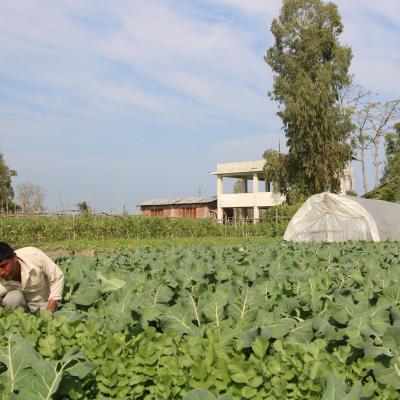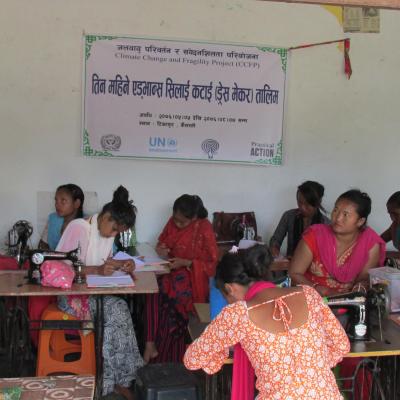Climate change and security in Nepal: Pilot intervention

Summary
The project was envisioned to strengthen the capacity in Nepal to identify environment and climate change-related security risks at community, national and global levels, and establish suitable risk reduction and response measures.
Climate change exacerbates enormous pressure on social, economic, political and natural resources of a country. Regions that are environmentally vulnerable and crisis affected are most susceptive to being overwhelmed by security risks posed by climate change. Insecurity has seemed to hinder climate change adaptation efforts, leaving already vulnerable communities poorer and less resilient to interlined climate and security crises, additionally peacebuilding and stabilization efforts seem to have overlooked these impacts.
To investigate and address these issues, the European Union (EU) and United Nations Environmental Program (UNEP) have established a partnership on climate and security. The program aims to develop an integrated approach to climate-conflict analysis and deliver actions on the ground to address compound-conflict risks. Two pilot interventions were designed and delivered in Sudan and Nepal as a solution to these climate-related security risks.
In Nepal, climate change is acting as a stressor on the existing drivers and structural causes of conflict, adding an additional layer of risk that exacerbates the challenges of livelihood insecurity, resource and identity conflicts and institutional reform. The assessment recognised the new constitution and federalist reform as an opportunity for addressing climate-related security risks and enhancing the inclusion of marginalised groups in all levels of decision-making. Some of the key problems in these fragile states of Nepal are:
- Lack of expertise at national level to identify, plan for, and respond to environmental and climate security risk
- Lack of knowledge at community level to design resilient livelihoods for environmental and climate security risks
- Lack of access to data and analysis that can identify and predict emerging environmental and climate security hotspots
- Institutional fragmentation leads to dispersed knowledge and to lack of uptake in conflict prevention and peacebuilding strategies
- Structural barriers preventing women from formally managing natural resources and engaging in risk reduction measure on environment and climate security
The key solutions implemented in the local-level intervention in Karnali River Basin in Western Nepal, as well as complementary actions at the global level, are:
- Guidance and support for multi-stakeholder decision making
- Field demonstration projects by local communities
- Global level hotspot monitoring and predictive analytics based on best available data
- Global and regional analysis conducted jointly by UNEP and UN partners in the field which feeds into UN planning
- Guidance and field projects on environmental and climate entry points for empowering women in peace-building
Evidence from the pilot intervention reflects that the project’s contribution to conflict prevention and peacebuilding in target communities, while at the national level, early indications point to improvements in planning for and responding to climate-related security risks. Globally, the project has contributed to shaping the emerging policy agenda on climate-security through strategic engagement with key entities and enhanced system-wide capacity for understanding, identifying, and addressing climate-related security risks.



Overview
- Implementation sites:
-
- Multiple countries
- Single location
- Mountain region:
-
Himalayas
- Site locations:
-
Karnali River Basin
- Solution scale:
- Ecosystem type(s):
- Other Ecosystem type(s):
-
- rural areas, natural parks
- Solution type(s):
- Other Solution(s) type(s):
-
- Governance, peacebuilding, social cohesion, climate-resilient livelihood.
- Climate impact time-scale(s):
- Other benefit(s) associated with the solution implementation:
-
- Conflict prevention, peacebuilding
- Co-benefit(s) associated with the solution implementation:
- Implementation timeline:
-
- 2019 - 2021
Solution details
Main beneficiaries & outcomes
Local communities, Government, poorest communities, indigenous people.
Planning and implementation
The project is designed and implemented by the United Nations Environment Programme, in a partnership with the European Union. In the delivery of the project, UNEP works hand in hand with the German think-tank Adelphi on analysis, advocacy, and capacity development. At national and community levels in Nepal and Sudan, the project is implemented through Practical Action, in close collaboration with local, state, and national authorities.
Finance
The project is financed with USD 600,000 supported by the European Union’s Instrument contributing to Stability and Peace.
Innovation
The key innovation aspect in the intervention was combining climate adaptation measures and peacebuilding approaches to strengthen resilience to climate-related security risks in target communities.
Performance evaluation
Yes, an initial round of field evaluation has been conducted. This entailed data collection conducted in February 2021, including testimony collected through interviews and focus group discussions with project beneficiaries and other key stakeholders as well as results from a household survey. The indicators were measured with field data.
The criteria taken into account include:
(A) Socioeconomic status
(B) Improved communication, participation and access to local government decision making
(C) Natural capital (climate impacts, conservation, access and benefit-sharing of natural resources)
(D) Human capital (livelihoods, migration)
(E) Financial capital (cooperation, banking, saving controlling)
(F) Social capital (identity, groups, trust, ethnicity, business, local governments, migrants)
(G) Physical capital (infrastructure, geo-protection)
Finally, the project has organized a series of events and consultations to present the tools and methodologies developed through the project, share emerging results from the pilot projects, hear feedback and discuss opportunities for uptake, as well as gaps and needs related to integrated analysis and programming on the ground. EU practitioners constitute a primary audience for the project’s good practices, training, tools, and methodologies. As the EU accelerates its own work on building resilience to climate-related security risks, dedicated consultations have been organized (in June 2021) with relevant EU actors in the field.
Long term project sustainability and maintenance
The project has many different mechanisms to ensure the sustainability of activities. When it comes to infrastructure, including water management (irrigation, water pumping), these were built after a conflict assessment and based on actual demand of climate vulnerable people, the management of the infrastructure is done through community-based organizations (CBOs) formed upon existing local initiatives. These CBOs ensure inclusive benefit-sharing among stakeholders, established a fund and conserve the infrastructure. Similarly, other CBOs are formed around the management of forests and land, which are essential natural resources in the Karnali River Valley. These organizations endorse and implement plans together with local actors (rural and municipal governments, and local NGOs). The CBOs are committed to look for effective operation, governance, and conflict resolution in the long run. The sustainability of the action is therefore ensured upon project closure.
Other activities included the institutionalization of a market with strong coordination among actors (farmers, traders, bankers), as well as development and access to market to those enterprises developed by local communities after offseason livelihood diversification training.
To highlight, at the peacebuilding level, many communities established dispute resolution mechanisms which were strengthened through capacity building as part of innovative climate and natural resources governance practices.
Capacities for design and implementation
Knowledge
The design of the project’s climate change adaptation and resilience building interventions were based on a two-year assessment of the area and the knowledge and customary relations of the local population. This was coupled with the latest scientific literature on climate security and best practices originated from previous environmental peacebuilding projects.
Technology
Technology capacities played a major role. The project has based its intervention on the use of technology since its inception. The area was mapped accordingly to understand the environmental and climate-related security risks as part of the baseline assessment. That data was complemented with qualitative data obtained from household surveys, focus group discussions, and key informant interviews, which were coded and assessed using a mixed-methods approach. Earth observation and local data were triangulated to inform the design and implementation of the intervention.
Political / Legal
The project reviewed Nepal’s national policies and guidelines related to agriculture, disaster response, and sustainable development, and provided concrete recommendations for enhancing resilience to climate-related security risks. For example, in 2019, the project reviewed the draft national climate change policy and incorporated key considerations for peace and security, such as the recognition of loss and damage and investments in early warning systems. In 2020, the project also contributed to Nepal’s National Determined Contributions, which as a result, integrated considerations linked to loss and damage as well as gender and social inclusion.
At the local level, in the Karnali River Valley, it was clear that there was a lack of rural and municipal planning and the project, based on the work of the local communities through their CBOs, developed a set of plans that were later included in local policies. For example, the Janaki government prepared a Local Adaptation Plan of Action (LAPA) and Municipality level Water Use Management Plan (WUMP), and similarly did the Rajapur and Geruwa municipalities.
Institutional
Communities received regular visits and training sessions from government representatives with expertise in animal health and agricultural techniques to support project interventions, such as capacity building of newly established animal veterinary centres or the distribution of drought-tolerant vegetable seeds. In some cases, community members reported that activities related to the project represented the first time they interacted with local government.
Additionally, marginalized communities have been traditionally excluded from public services and decision making. Hence the project established inclusive Community Disaster and Climate Resilience Committees (CDCRC). This program facilitated dialogues between government and local communities over disputed land, and community needs are recognized in their governance.
Overall the coordination was good, notwithstanding the changes in the different levels of government as a result of the various political transitions held during the development of the project. This is a critical lesson learned when working in post-conflict contexts, where government officials have major turnover and, as a result, sometimes it becomes complex to build lasting relationships with the government.
Socio-cultural
The CDCRC together with a committee formed by the Geruwa River flood victims launched a public campaign to advocate for more just treatment by the municipality for those who had lost their land and facilitated a constructive dialogue between park authorities and the community. The process resulted in a decision by the Geruwa Rural Municipality to reduce the land tax for flood victims by 75 percent and in January 2021, a plan was approved to construct a dam along the border of the National Park.
Outlook & Scalability
Barriers and adverse effects
The high turnover of Government officials may have been the greatest barrier experienced. However, the strong connection of the local implementing teams with the government helped mitigate the issues related to turnover. In terms of natural resources and climate, the greatest limitations were related to land governance between communities and local authorities. In this line, the community-based organizations improved their dispute resolution skills and substantially reduced or fully addressed most of the conflicts over natural resources. It is to expect no side effects to these solutions since it was addressed by the communities themselves, and they have the skills to continue managing such barriers.
Transformation and future outlook
The project has made positive contributions towards three peacebuilding and climate change adaptation objectives:
- Improved relationships as a result of conflict-sensitive climate adaptation and resilience-building measures
- Strengthened capacity of communities to mediate disputes and prevent conflict through more inclusive natural resource-related governance mechanisms
- Post-conflict economic recovery enhanced for vulnerable or marginalised groups through the provision of climate-resilient livelihoods
Potential for upscaling and replication
The impacts of climate change in Nepal, and their complex implications for peace and security, argue for urgent action on developing a shared understanding of key linkages and a common risk reduction, mitigation, and prevention agenda for the country. Opportunities and entry points for action exist across the policy and programming realms, and at national, sub-national, and local levels, building on the measures already taken by the Government of Nepal to build resilience to impacts of climate change, as well as existing programming by UN and other international partners on climate change adaptation, disaster risk reduction, natural resource management, conflict prevention, and peacebuilding.
Early experiences from this project suggest that it is possible and desirable to work towards scaling up efforts to integrate conflict sensitivity and social cohesion objectives into climate change adaptation investments. These have already shown promising results in some areas of the country, which can be scaled (adapting for context) through multi-stakeholder partnerships across Nepal, building on successful early experiences in areas such as the Karnali River Basin. However, it is critical to note that upscaled initiatives must remain cognizant of the contextual needs at the local level and design policies and programmes appropriately, avoiding generalization of assumptions and dynamics or wrongly extrapolating learnings from one project to another. Local understanding must be taken into consideration for national-level planning.










Comments
There is no contentYou must be logged in to reply.